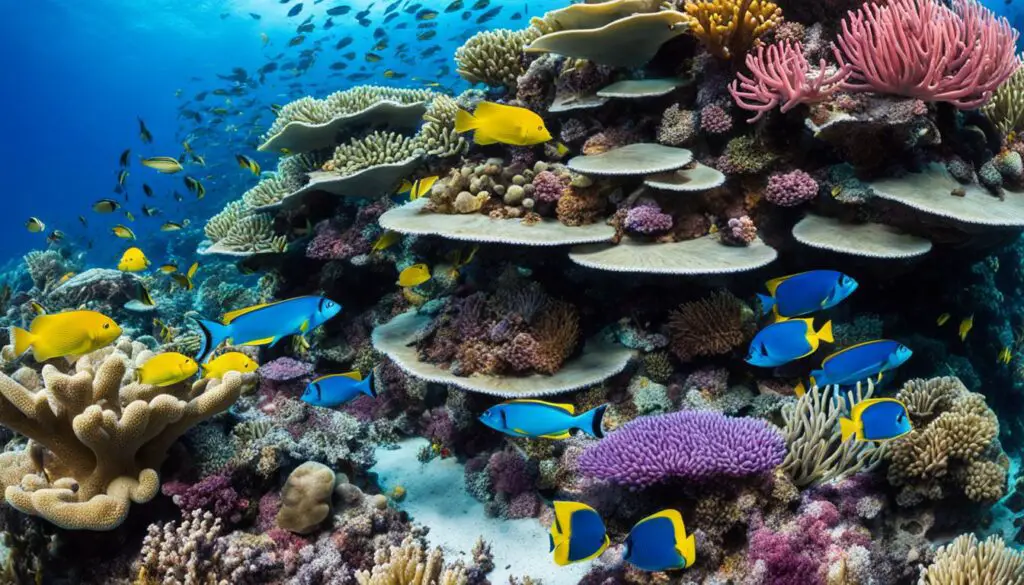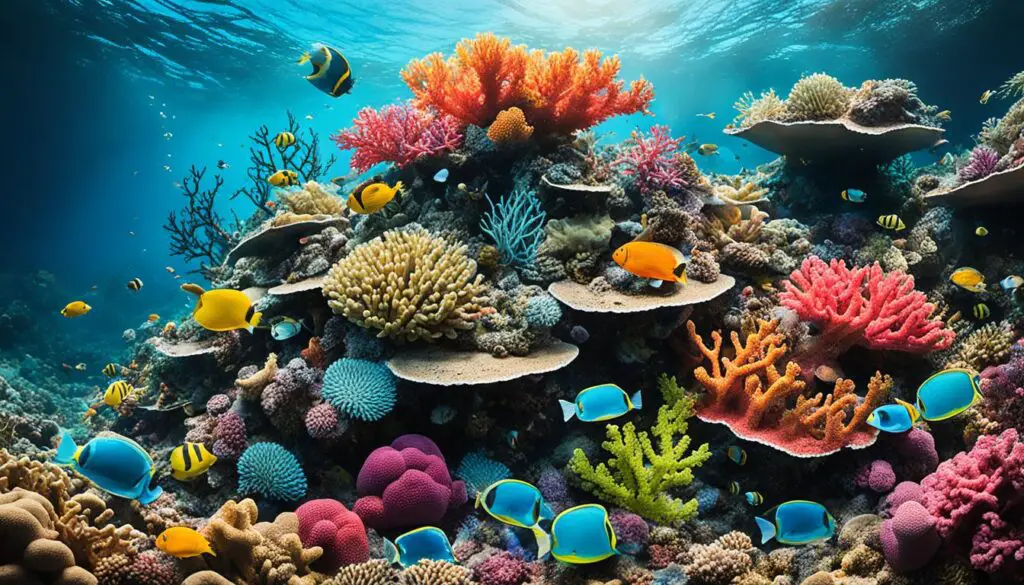Coral reefs are crucial marine ecosystems that provide a habitat for a diverse range of marine life and offer numerous ecosystem services. However, these magnificent reefs are under considerable threat. Factors such as climate change, pollution, overfishing, and habitat destruction pose significant risks to their survival. To safeguard the future of coral reefs and ensure the well-being of marine ecosystems, a series of initiatives and measures are being implemented worldwide.
These coral reef protection initiatives aim to secure the longevity and resilience of these valuable marine ecosystems. By addressing the threats they face, we can safeguard the ecological balance and ensure the well-being of future generations.
Key Takeaways:
- Coral reefs are essential for marine ecosystems and support a diverse range of marine life.
- Threats such as climate change, pollution, overfishing, and habitat destruction put coral reefs at risk.
- Coral reef protection initiatives aim to preserve and restore these vital ecosystems.
- Conservation measures, marine protected areas, and sustainable fishing practices are part of these initiatives.
- Monitoring programs help understand coral reef ecosystems and develop effective management strategies.
Understanding the Importance of Coral Reefs
Coral reefs are often referred to as the “rainforests of the sea” due to their high levels of biodiversity and the important ecosystem services they provide. These underwater ecosystems are teeming with life, supporting a wide range of marine species including fish, invertebrates, and plants.
Biodiversity:
Coral reefs are incredibly diverse habitats, hosting a vast array of species. They provide a home to approximately 25% of all marine species, despite covering less than 1% of the Earth’s surface. This extraordinary biodiversity makes coral reefs essential for maintaining a healthy and thriving marine ecosystem.
Ecosystem Services:
In addition to supporting diverse marine life, coral reefs also provide crucial ecosystem services. One of their most vital functions is coastal protection. Coral reefs act as natural barriers, reducing the energy of incoming waves and protecting coastlines from erosion. They help to maintain the stability of sandy beaches, prevent land loss, and safeguard coastal communities from the destructive power of storms.

Coral reefs also offer significant economic benefits to local communities. They are a valuable source of food and income through fishing activities and support vibrant tourism industries. Snorkeling and diving enthusiasts from around the world visit coral reefs to witness their beauty and encounter the diverse marine life they harbor.
Understanding the importance of coral reefs is crucial for their conservation and protection. By recognizing their invaluable role in supporting biodiversity and providing essential ecosystem services, we can work towards preserving these vital ecosystems for present and future generations.
Threats to Coral Reefs
Coral reefs, despite their importance as marine ecosystems, are facing an array of threats that pose a serious risk to their survival. These threats encompass various factors, including climate change, pollution, overfishing, and habitat destruction. Each of these challenges contributes to the degradation of coral reefs worldwide, accentuating the urgency for conservation efforts.
Climate Change
Climate change stands as one of the most significant threats to coral reefs. As global temperatures rise, so do sea temperatures, leading to detrimental consequences for coral reefs. The increased heat stress inflicted upon corals causes a phenomenon known as coral bleaching, whereby the coral expels the algae that provide them with essential nutrients and vibrant colors. Consequently, the bleached corals become susceptible to disease and have a diminished capacity to recover. Additionally, climate change contributes to ocean acidification, which negatively affects the ability of corals to build their skeletal structures, impairing their growth and resilience.
Pollution
The presence of pollution in marine environments poses a considerable threat to coral reefs. Pollutants such as agricultural runoff, sewage, and marine debris contaminate the waters surrounding coral reefs, causing harm to the delicate ecosystems. Agricultural runoff introduces excess nutrients into the water, leading to an overgrowth of algae that can smother corals and hinder their growth. Sewage can introduce harmful bacteria and chemicals, while marine debris, such as plastic, entangles and smothers corals, impacting their health and ability to survive.
Overfishing
Overfishing disrupts the delicate balance within coral reef ecosystems, threatening their overall health and productivity. When certain fish species are excessively harvested, the ecological equilibrium is disturbed, affecting the entire food web and trophic dynamics of the reef. The removal of key fish species can lead to an increase in algae and coral predators, compromising the resilience and vitality of coral reefs. Additionally, destructive fishing practices, such as the use of explosives or bottom trawling, can directly damage coral habitats and indiscriminately capture non-target marine species, exacerbating the detrimental effects on coral reef ecosystems.
Habitat Destruction
Habitat destruction poses a significant threat to the long-term survival of coral reefs. Coastal development activities, such as land reclamation and construction, can directly destroy coral habitats and disrupt their fragile balance. Unsustainable fishing practices, such as the use of damaging fishing gear that destroys coral structures, also contribute to habitat destruction. The loss of suitable habitats for corals and associated marine species reduces their ability to thrive and recover, further endangering the overall health of coral reef ecosystems.

As the threats facing coral reefs continue to intensify, urgent action is required to protect and restore these valuable marine ecosystems. The next section will explore the various coral reef protection initiatives being implemented globally, highlighting the conservation measures aimed at preserving the future of coral reefs.
Coral Reef Protection Initiatives
Protecting and conserving coral reef ecosystems is crucial to ensure their long-term survival. To address the threats facing coral reefs, various initiatives and conservation measures have been implemented globally.
One of the key initiatives is the establishment of marine protected areas (MPAs). These areas are designated and managed to safeguard the diverse marine life and delicate ecosystems found within coral reefs. By restricting certain activities and promoting sustainable practices, MPAs help reduce the impact of human activities on coral reefs.
Another important conservation measure is the adoption of sustainable fishing practices. Overfishing and destructive fishing methods pose significant threats to coral reef ecosystems. By implementing regulations and promoting responsible fishing practices, such as size and catch limits and the use of selective gear, the pressure on coral reefs can be reduced, allowing their populations to recover and thrive.
In addition to protecting against direct threats, pollution control measures play a crucial role in coral reef conservation. These measures focus on reducing the impact of pollution from agricultural runoff, sewage, and marine debris on coral reefs. By implementing effective waste management systems, promoting sustainable agricultural practices, and raising awareness about the issue, the harmful effects of pollution on coral reefs can be minimized.
Furthermore, ongoing research and monitoring programs are critical in understanding coral reef ecosystems and developing effective management strategies. By studying the ecological processes and the impacts of various stressors, scientists and conservationists can better assess the health of coral reefs and make informed decisions about their protection and restoration.
Through these coral reef protection initiatives, which include the establishment of marine protected areas, the adoption of sustainable fishing practices, the implementation of pollution control measures, and ongoing research and monitoring, we can work towards safeguarding these invaluable ecosystems for current and future generations.
FAQ
What are coral reefs?
Coral reefs are vital marine ecosystems that support a diverse range of marine life and provide numerous ecosystem services. They are often referred to as the “rainforests of the sea” due to their high levels of biodiversity and the important role they play in coastal protection, food production, and tourism.
What are the threats facing coral reefs?
The threats facing coral reefs include climate change, pollution, overfishing, and habitat destruction. Climate change leads to rising sea temperatures and coral bleaching, while pollution from agricultural runoff, sewage, and marine debris harms coral reefs. Overfishing disrupts the delicate balance of reef ecosystems, and habitat destruction from coastal development and unsustainable fishing practices further damages coral reefs.
What initiatives are being implemented to protect coral reefs?
There are several initiatives and measures being implemented worldwide to protect coral reefs. These include the establishment of marine protected areas (MPAs) to conserve coral reef ecosystems, the adoption of sustainable fishing practices to reduce overfishing and destructive methods, and the implementation of pollution control measures to minimize the impact of pollution on coral reefs. Additionally, research and monitoring programs are in place to better understand coral reef ecosystems and develop effective management strategies.
